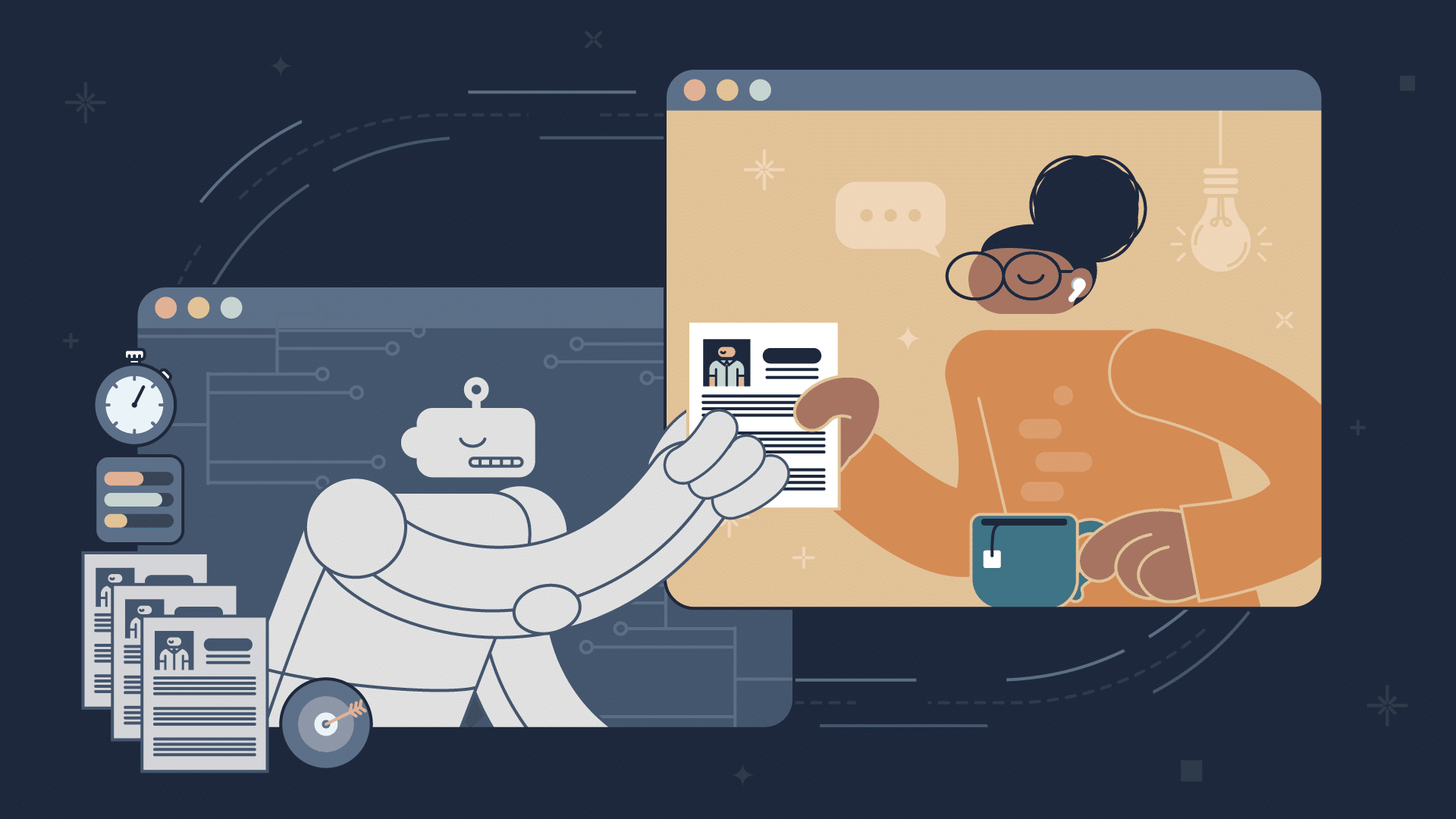As AI brings a new wave of recruitment innovation, search firms gear up to roll with the changes — again. In the internet era, recruiters shifted from paper resumes, print advertisements, and cold-calling to digital job boards, applicant tracking systems, and online recruitment. Now, talent acquisition professionals are quickly embracing the newest digital transformation: AI integration.
A stunning 65% of companies are leveraging AI technologies in their hiring processes, according to the Society for Human Resource Management, revolutionizing everything from job description creation to initial candidate screening.
This latest shift isn’t about replacing human recruiters, but elevating them. As cutting-edge technologies merge with industry experience and human expertise, talent acquisition is entering a new era, reshaping how top talent is discovered, evaluated, and secured.
This article explores the new hiring landscape, where AI handles repetitive tasks and recruiters focus on the human connections that make great hiring possible.
The Role of AI in Modern Recruitment
The integration of artificial intelligence in the recruitment process supports recruiters with game-changing efficiencies in identifying, evaluating, and hiring candidates, as well as predicting candidate success.
Similar to its effect on other industries, in recruiting, AI streamlines processes, enhances productivity, and advances strategy. According to Deloitte’s 2024 Year-End Generative AI Report, 40% of surveyed businesses reported increased overall productivity, and a 45% boost in strategic areas.
In talent acquisition, AI is already making significant strides in creating efficiency and driving strategy in key areas such as market research, candidate sourcing, resume screening, initial candidate assessments, and predictive hiring analytics.
AI is already having a widespread impact on how recruiters and organizations approach hiring. Meanwhile, its full impact is still unfolding and will continue to evolve.
Key AI Recruitment Statistics You Should Know
To fully appreciate AI’s impact on recruitment, here are a few key points revealing how quickly this technology is shaping the hiring industry:
- Up to 65% of companies are using AI in their recruitment process. The Society for Human Resource Management (SHRM) notes that this signals a massive shift in hiring strategy.
- 40% of businesses report increased overall productivity with AI. Deloitte’s 2024 Generative AI Report adds that 45% also report AI-driven improvements in strategic and innovative areas.
- 70% of talent acquisition professionals agree that AI improves hiring efficiency, as reported by LinkedIn’s Future of Recruiting 2025 survey, which also notes that 73% of recruiters agree that AI will change how organizations hire.
- Experts agree AI has the potential to reduce bias in hiring practices. However, the verdict remains on whether AI algorithms introduce their own discrimination. Recent studies investigate this question, and stakeholders and watchdogs, such as the U.S. Equal Employment Opportunity Commission, are wrapping it into policies regarding AI and hiring.
- 71% of Americans oppose AI having the final decision in hiring. A study by Pew Research found that most accepted the increased efficiency for routine tasks, but wanted human insight and expertise to prevail.
- AI hiring tools can improve candidate experience quality. McKinsey & Company studies cite AI’s impact on greater efficiency and personalization of outreach as major factors in candidate satisfaction.
- 61% of talent acquisition experts believe AI can improve metrics for quality. LinkedIn’s Future of Recruiting 2025 also cites the role of AI tools for data analysis and predictive insights in assisting recruiters in swift, informed decision-making.
- AI’s expansion into recruitment is expected to have over 6% compound growth annually through 2030. SHRM predicts rapid enhancement of the recruiting and hiring functions year-over-year.
The Evolution of AI in Executive Search
With the rapid advancement of AI in the recruitment space, the most significant benefit to search professionals is as an enhancement to the process, rather than a replacement of human elements. “The most successful recruiting firms today are those that strategically blend AI expertise with deep human expertise,” says Chloe Rosenthal, President of Millman Search, a firm specializing in executive search.
Experts in the field understand the mechanics of recruitment, have extensive networks, and know how to effectively work with clients and candidates. This experience cannot be replicated in an AI tool, nor should it be.
“In our 40-year history at Millman Search, we’ve participated in numerous technological shifts,” Rosenthal notes. While AI’s transformation is the most significant the recruiting industry has seen, Rosenthal values the introduction of AI tools as bringing powerful enhancements and efficiencies to the process, allowing the Millman Search team to focus on the human connection that has established their firm as a leader in executive search.
Rosenthal illustrates that the future of executive search lies not in choosing between AI and human insight, but in creating a powerful synergy that elevates the entire recruitment process — for recruiters, clients, and candidates.
Understanding how AI has evolved in executive search reveals specific areas where this technology delivers value throughout the recruitment process.
Where AI Adds Value in Candidate Recruitment and Selection Lifecycle
While a technological tool cannot replace a seasoned recruiter’s nuanced judgment, AI has numerous opportunities to streamline tasks, boost efficiency, and help deepen recruiter insights.
Reduced Initial Screening Time
AI’s ability to quickly parse resumes and match key skills and qualifications helps recruiters compile a shortlist of top candidates in record time. Rosenthal explains how Millman Search employs AI tools in executive search: “AI has dramatically improved our ability to process vast candidate databases, reducing initial screening time.” This approach significantly reduces time-to-hire for clients while improving initial response time for candidates and ultimately helping recruiters identify the strongest talent more efficiently.
Faster Identification of Promising Candidates
Smart-matching algorithms help Millman Search identify talent that might have been overlooked through traditional methods. AI’s ability to pinpoint transferable skills, non-traditional experiences, and a broad range of other attributes helps bring high-potential candidates to the forefront. Rosenthal notes that while human experts at firms like Millman Search have always sought these non-traditional factors, AI tools have now enhanced their ability to locate key candidates faster.
Increased Administrative Efficiency
Perhaps the most oft-cited benefit of AI’s integration into any business application is its ability to streamline processes by performing routine tasks at a speed previously unheard of, allowing professionals to focus on strategy, connection, and high-value human interactions that create meaningful impact.
At Millman Search, they have experienced these efficiencies firsthand. By leveraging tech tools for automated scheduling, initial outreach, and follow-up communications, Rosenthal explains that her team can concentrate more deeply on search strategy and client partnership development.
Data Analytics Deeper Insight
Perhaps AI’s most powerful ability in general is transforming vast amounts of raw data into actionable insights that can be applied strategically to the process they are analyzing. While traditional recruitment has already moved toward using advanced databases, AI tools bring an unprecedented advantage to recruiters, synthesizing complex data sets to uncover patterns and trends that were previously unattainable.
This upgrade in data analytics, Rosenthal explains, provides recruiters with far deeper insights into industry talent pools, compensation trends, and candidate movement patterns. In the hands of an expert recruiter, this advanced knowledge elevates search strategy and provides predictive insight that crystallizes vision and empowers forward-facing hiring decisions.
Challenges of AI in Talent Acquisition and How to Mitigate Them
Algorithmic Bias Concerns
AI algorithms can inadvertently perpetuate existing biases present in historical hiring data, potentially advancing the very discrimination that organizations and recruiters strive to eliminate. In some cases, AI can introduce new biases through flaws in algorithmic design. For instance, in 2018, Amazon’s AI recruitment tool was scrapped after revealing significant gender bias, leading the company to adopt a more balanced approach, integrating AI tools with human insight.
Solution: Schedule regular, ongoing bias audits of AI tools. If using a third-party vendor, demand evidence of their due diligence and bias mitigation strategies. Don’t rely solely on the vendor for audits. Periodically conduct your own review of the tool’s results and have your own mitigation plan in place. Above all, ensure consistent human insight and review of AI-recommended results regularly. Ultimately, the responsibility for fair hiring practices lies with your company—never relinquish complete control of the selection process to even the most advanced technological tool.
Variable Quality of AI Solutions
The market is flooded with AI recruitment tools of widely varying capabilities, creating a challenge for talent acquisition professionals. The sheer number of options seemingly requires its own AI-powered solution to navigate. As with any tool, not all AI technologies are created equally or provide similarly accurate or reliable results.
Solution: Conduct thorough, multi-stage vendor assessments and request comprehensive, in-depth demonstrations. Leverage industry conferences, trade publications, and peer networks to discover which solutions are effective for organizations with similar challenges. Implement rigorous pilot programs to test the actual impact of the AI tool on your process. Prioritize those solutions with:
- Transparent, well-documented methodology
- Proven track records of success
- Clear, measurable performance metrics
Before implementing any tool, ensure the use of AI aligns with your company’s established policies and ethical guidelines, and vet each vendor’s data handling and privacy protocols.
Technical and Implementation Challenges
Integrating AI recruiting tools into an existing methodology and process can be complex, requiring significant technical expertise, changes to existing systems, and substantial initial investment of time and resources.
Solution: Partner with an experienced AI implementation specialist and prepare a detailed plan for staff training and a phased approach for AI integration. Start small, with the guidance of an internal or external expert, and gradually expand AI applications.
Candidate Concerns and Resistance
Skepticism and even fear around artificial intelligence still abound in the general public and job seekers. From impersonal screening and potential algorithmic discrimination to insecurity of personal data and lack of a personal touch, some candidates don’t trust AI with such a critical milestone in their lives and may avoid engaging with AI-driven recruitment tools.
Solution: Maintain transparency about AI’s role in the recruitment process, consistently emphasizing the irreplaceable human insight and personal touch that define professional talent acquisition. Proactively address candidate concerns by clearly articulating how AI serves as a strategic enhancement — not a replacement — for the meticulous, relationship-driven searches your firm is known for conducting.
Impersonal Approach to a Human-Centered Business
Recruitment is, at its heart, about human connections. Over-reliance on AI can mechanize the approach, eroding the connection-based interactions and relationship-building that are crucial to successful talent acquisition.
Solution: Leverage AI’s strengths without losing sight of the invaluable assets of recruiting professionals. Position AI as a supportive tool that frees recruiters of administrative tasks to focus on valuable human interactions. Ensure AI is used as a strategic and beneficial enhancement, not a replacement for personal engagement. Maintaining the human touchpoints throughout the recruitment process is critical to success.
The Irreplaceable Human Element: Balancing AI Efficiency with Human Insight
Not only is recruiting inherently a human-centered business that thrives on authentic person-to-person connections, but it is also an industry where firsthand human knowledge is critical to accurate and successful placements.
“Executive search at its core remains a relationship business,” says Rosenthal. “Understanding the nuanced needs of our clients in real estate, retail, luxury retail, and hospitality requires contextual intelligence that AI cannot replicate.”
Millman Search recruiters have extensive experience in the fields they recruit for. In the firm’s 40-year history, the networks they have built and the trust relationships they have forged form the foundation of their reputation as an executive search firm that secures successful results.
“Through our decades of experience, we use our human gifts refined over decades of practice to assess cultural fit, leadership potential, and interpersonal dynamics,” Rosenthal notes that this is what clients expect of Millman Search.
“Our clients value our ability to serve as strategic advisors who understand the subtleties of their business challenges beyond just filling positions.”
4 Best Practices for Implementing AI in Recruitment
Implementing AI in recruitment isn’t a one-size-fits-all approach. It’s a strategic and intentional shift that must be tailored to the specific organization or firm. Integration requires careful planning, mindful execution, and a commitment to blending AI with the critically essential human elements in talent acquisition. Here are a few general ideas for getting started.
Assessing Organizational Readiness
Recruitment leaders must first critically assess their team, processes, infrastructure, and adaptability. These factors and others contribute to organizational readiness and impact the planning and approach to technological transitions. The Association for Intelligent Information Management suggests conducting an assessment that explores the intersection between what your organization knows and what artificial intelligence will bring.
Selecting the Right AI Tools
Recruiters must employ a strategic approach to understand each AI solution’s deeper features, alignment with organizational goals, and outcome accuracy. Successful selection involves engaging in comprehensive vendor assessments, pilot testing, and rigorous evaluation and vetting of each tool and its vendor.
Maintaining the Human Element
Whichever AI tools are implemented into the recruitment process, they should be viewed as powerful tools to enhance recruiters capabilities, not a replacement for critical human judgment and relationship-building. Intentionally design an integration strategy that acknowledges this balance from the start, preserving and amplifying the essential human touchpoints in recruitment and integrating technology support and enhancements.
Measuring Success and Continuous Improvement
As with any new tool, AI technologies are only as good as their measurable success. Effective AI implementation requires the development of clear, measurable metrics that address not only quantitative data but also qualitative factors such as candidate experience and strategic talent acquisition.
These best practices are at the foundation of successful AI integration, but the most effective recruitment firms go beyond standard implementation to develop a distinctive approach aligning technology with their own organizational strengths, industry expertise, and client expectations. One such approach — augmented intelligence — represents an ideal balance between technological efficiency and human insight.
The Millman Approach: Augmented Intelligence
For experienced recruiters, the best approach to integrating artificial intelligence into their talent acquisition process is one that blends AI with human expertise. This method allows a firm to leverage the strengths AI introduces to recruitment, while preserving and amplifying the skills and talents of seasoned recruiting professionals.
“At Millman Search, we’ve adopted a human-led, technology-enabled approach that leverages AI for efficiency while preserving the high-touch service our clients expect,” says Rosenthal. Millman Search recruiters now spend fewer hours on administrative tasks and more on building relationships and providing strategic counsel. In this way, she says, “AI is win-win for everyone.”
Looking Forward: What’s Next for AI in Recruitment?
For recruiters, candidates, and talent-seeking companies, the future of AI in recruitment is promising — when approached with strategic insight and human experience. Undoubtedly, AI introduces significant time-saving and strategic benefits to the recruiting process. However, these advancements are fundamentally enhancements that allow expert recruiters’ nuanced skills and refined experiences to shine more brightly.
As Rosenthal puts it, “The future of executive search isn’t about AI replacing recruiters, but about exceptional recruiters who effectively leverage AI.” At Millman Search, recruiters anticipate continued evolution in integrating technology with their deep industry knowledge, while maintaining an unwavering commitment to personalized service.
As in so many industries, recruiters are discovering that AI integration puts a new emphasis on human connection. While technology tools efficiently manage tasks that once consumed valuable time, professionals now find themselves with greater opportunities to connect and build relationships. This is precisely what Rosenthal envisions.
“As technology continues to advance,” she says, “the premium of authentic human connection in business relationships only increases. We’re excited about that. At Millman Search, that is why we do what we do—to uncover the human stories and potential behind every professional connection.”
As we look toward this AI-enhanced future of recruitment, the fundamental principles remain: successful talent acquisition will always balance technological advancement with the irreplaceable human elements that define exceptional recruiting.
Final Thoughts
AI in recruitment is a technological advancement that is here to stay and continues to evolve. Benefits such as increased administrative efficiency, more strategic data analysis, and reduced time-to-hire have given recruiters deeper insights and more time to focus on the strategic and human-centered aspects of talent acquisition. However, AI implementation in recruiting is not without its challenges, from potential algorithmic bias to perceived loss of human touch. In a business fundamentally about people and connections, recruitment can only benefit from technological advancement when mindfully and strategically integrated with the experience, expertise, and personal touch of professional recruiters. The human-led, technologically-driven approach brings the best of both worlds to talent acquisition, resulting in exceptional outcomes for clients and candidates.
FAQs
How can AI reduce bias in hiring?
AI can reduce bias by expanding candidate pools and screening candidates on relevant skills, qualifications, transferable skills, non-traditional experience, and other traits rather than demographic factors that might trigger an unconscious bias. However, algorithms can have faults, so AI screening should be audited frequently to assess and address bias. Most importantly, human oversight should be an integral part of hiring.
Can AI improve diversity hiring?
AI can potentially improve diversity hiring by reducing bias, expanding candidate pools, and identifying qualified individuals from underrepresented groups. AI can also be used to track and analyze hiring data more efficiently to identify and address diversity gaps. In addition, it can standardize interview questions and evaluation criteria to ensure consistent and fair assessment of all candidates.
How can companies integrate AI into their hiring process?
Companies can integrate AI tools into their hiring process that automate or assist in resume screening, skills assessment and initial candidate outreach. AI tools can also assist with administrative tasks, allowing recruiters to focus on strategy and relationship-building. Integration is a process that requires a stepped approach, clear objectives, careful research, thorough training and regular auditing. Many companies prefer to hire an AI expert or consultant to assist in the process. Above all, AI integration requires transparency with all involved parties.




